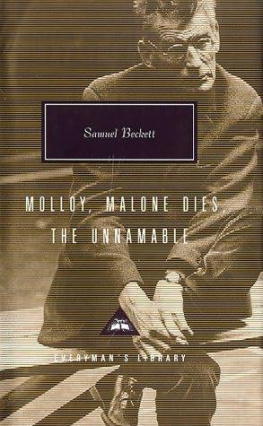Samuel Beckett - Molloy
Here you can read online Samuel Beckett - Molloy full text of the book (entire story) in english for free. Download pdf and epub, get meaning, cover and reviews about this ebook. year: 2009, publisher: Faber and Faber, genre: Detective and thriller. Description of the work, (preface) as well as reviews are available. Best literature library LitArk.com created for fans of good reading and offers a wide selection of genres:
Romance novel
Science fiction
Adventure
Detective
Science
History
Home and family
Prose
Art
Politics
Computer
Non-fiction
Religion
Business
Children
Humor
Choose a favorite category and find really read worthwhile books. Enjoy immersion in the world of imagination, feel the emotions of the characters or learn something new for yourself, make an fascinating discovery.
- Book:Molloy
- Author:
- Publisher:Faber and Faber
- Genre:
- Year:2009
- Rating:4 / 5
- Favourites:Add to favourites
- Your mark:
- 80
- 1
- 2
- 3
- 4
- 5
Molloy: summary, description and annotation
We offer to read an annotation, description, summary or preface (depends on what the author of the book "Molloy" wrote himself). If you haven't found the necessary information about the book — write in the comments, we will try to find it.
Molloy — read online for free the complete book (whole text) full work
Below is the text of the book, divided by pages. System saving the place of the last page read, allows you to conveniently read the book "Molloy" online for free, without having to search again every time where you left off. Put a bookmark, and you can go to the page where you finished reading at any time.
Font size:
Interval:
Bookmark:
In March 1951, Les ditions de Minuit, a small, financially insecure Paris-based publishing house, released a new novel with the decidedly un-French title Molloy. On the verso facing the title page, the publisher listed five other works by the same author: three novels. Murphy,Malonemeurt (MaloneDies) and LInnommable (TheUnnamable), and two plays, Eleutheria and EnattendantGodot (WaitingforGodot). With the exception of Murphy, however, all of these works were identified as forthcoming . As for the author of so much unpublished material, Samuel Beckett was known at the time only to a small circle of other European writers, painters and intellectuals, his principal publications a short monograph on Marcel Proust (1931), a collections of short stories, MorePricksThanKicks (1934), and the novel Murphy (1938; French translation 1947) having attracted some favourable reviews but few readers. That reputation was to be transformed irrevocably by the publication of Molloy, followed by Malonemeurt in November of the same year and LInnommable two years later, together with the full stage production of Godot in January 1953. Indeed, by 1953 French reviewers were regularly placing Beckett in the company of some of the major writers of the century, including Proust, Joyce, Kafka and Camus.
For a sense of the critical affirmation with which Molloy was received in France, one need look no further than the press opinions displayed in an ditions de Minuit advertisement printed in the Winter 19523 issue of Merlin, an English-language literary magazine published in Paris, the editors of which were to be instrumental in the publication of the subsequent English translation of Molloy by the Olympia Press in 1955. The advertisement includes the following critical judgements on the novel:
Begun in Ireland on 2 May 1947 and completed in France only six months later, on 1 November 1947, Molloy belongs with a number of other major prose and dramatic works written by Beckett between 1946 and 1951, including not only those listed as forthcoming in the first edition of Molloy but also four long stories (all written in 1946) and thirteen short texts (written in 19501, after the completion of LInnommable), published together as NouvellesetTextespourrien in 1955. This remarkable frenzy of writing as Beckett was to describe it
If that vision in his mothers room gave Beckett a clearer sense of what he should be writing, it also, and no less importantly , had a major impact on how he would write. As he put it in conversation with Charles Juliet in October 1968: When I wrote the first sentence in Molloy, I had no idea where I was
The early French reception of Molloy tended to place it within the then-dominant mode of existentialism, perhaps unsurprisingly. According to Maurice Nadeau, for instance, Beckett settles us in the world of the Nothing where some nothings which are men move about for nothing. The absurdity of the world and the meaninglessness of our condition are conveyed in an absurd and deliberately insignificant fashion: never did anybody dare so openly to insult everything which man holds as certain, up to and including this language which he could at least lean upon to scream his doubt and despair.
If the early reception of Molloy tended to place it in a philosophical context, subsequent readings often emphasised the novels engagement with psychoanalysis. As early as March 1954, Thomas Hogan (in IrishWriting, no. 26) identified Molloy as a representation of the id, and the narrator of Part II, Jacques Moran, as a representation of the ego. As his 1930s reading notes reveal, when he was in analysis with Wilfred Bion in London, Beckett acquainted himself with a wide range of psychoanalytic writing, including the work of Freud, Jung, Alfred Adler and Otto Rank, of which explicit traces can be found in Molloy, with its references to the fatal pleasure principle and to the Obidil (an anagram of libido).
Breaking with the existentialist reading, in the late 1980s and 1990s attention was redirected towards the novels narrative of self-undoing and its rhetoric of paradox and aporia. This concentration on the novels language included increased reflection upon its status within Becketts bilingual uvre. In this respect, Molloy stands out from the majority of his other works, since it is one of very few French texts the English translation of which he entrusted (in large part) to another. Although completing the original French version of Molloy by the beginning of November 1947, it was not until October 1950 that Beckett finally secured a publisher for the novel, and that principally through the efforts of his partner (later to be his wife), Suzanne Deschevaux-Dumesnil. Six months before the appearance of the French edition in March 1951, however, part of the text had already been published in Becketts own English translation in Georges Duthuits TransitionFifty, no. 6.
That the complete English version of Molloy came to be published by the Olympia Press is owing to chance. In 1951 Richard Seaver happened to read, and was impressed by, both Molloy and Malonemeurt. Seaver published his introductory essay on Beckett in the Autumn 1952 issue of Merlin, the literary magazine run by Alexander Trocchi and a group of other expatriates, including Seaver, Patrick Bowles, Christopher Logue and Austryn Wainhouse (whom Beckett would later refer to collectively as the Merlin juveniles). Beckett had completed an unpublished novel in English (Watt), Seaver requested an extract for Merlin. The extract (chosen by Beckett) duly appeared in the Winter 19523 issue. Hoping to extend their activities to book publication, the Merlin editors next came to an arrangement with Maurice Girodias, who was setting up the English-language Olympia Press in Paris. Watt was published by the Olympia Press in its Collection Merlin in August 1953, and, despite his annoyance at the numerous typographical errors, Beckett gave permission for publication in the same collection of an English translation of Molloy, which appeared in March 1955.
The title page of the Olympia Press edition of Molloy states that the work is a novel translated from the French by Patrick Bowles in collaboration with the Author. According to Bowles, when in July 1953 Beckett chose him as the translator of Molloy, he did so because he wanted a writer rather than a translator. However, Becketts comments on the translation process in letters to Pamela Mitchell reveal his strong distaste for such a revising role, and he would translate his subsequent French works on his own.
As mentioned above, in October 1950, six months before the publication of Molloy in French, Becketts own translation of a short passage from Part I was included in TransitionFifty, no. 6, as the first of Two Fragments, the second being the opening of MaloneDies (see Appendix, pp. 1879). bientt trop tard, quil ltait peut-tre dj, pour procder au rglement en question, je me sentais qui drivais vers dautres soucis, dautres spectres) becomes: And while saying to myself that time was running out, and that soon it would be too late, was perhaps too late already, to settle the matter in question, I felt myself drifting towards other cares, other phantoms. Or again, For if my region had come to an end at a reasonable remove, surely a sort of gradation would have marked the fact (translating Car si ma rgion avait fini porte de mes pas, il me semble quune sorte de dgradement me laurait fait pressentir) becomes:
Font size:
Interval:
Bookmark:
Similar books «Molloy»
Look at similar books to Molloy. We have selected literature similar in name and meaning in the hope of providing readers with more options to find new, interesting, not yet read works.
Discussion, reviews of the book Molloy and just readers' own opinions. Leave your comments, write what you think about the work, its meaning or the main characters. Specify what exactly you liked and what you didn't like, and why you think so.

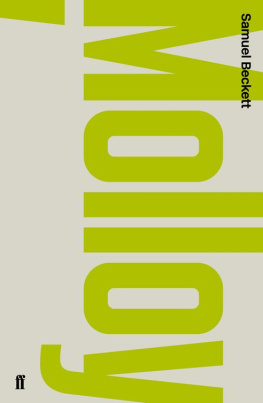
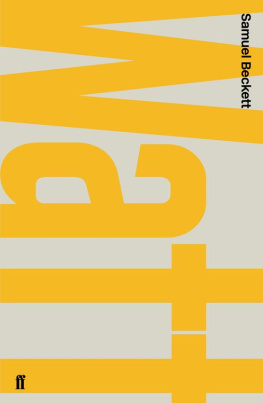
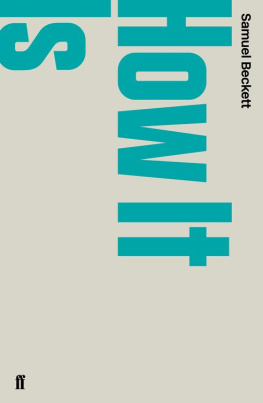
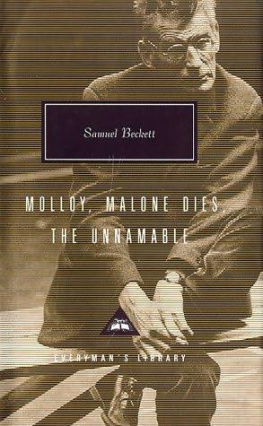
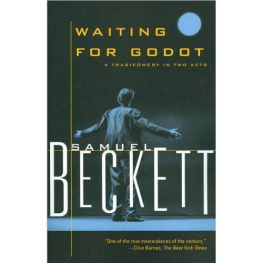
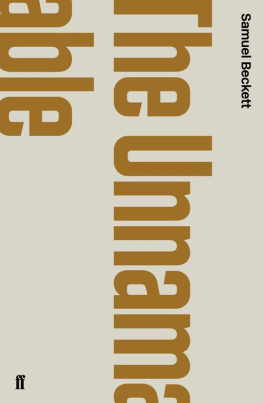
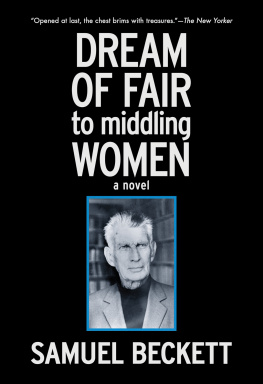



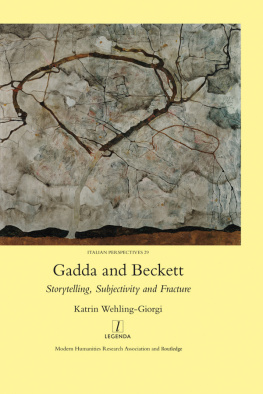

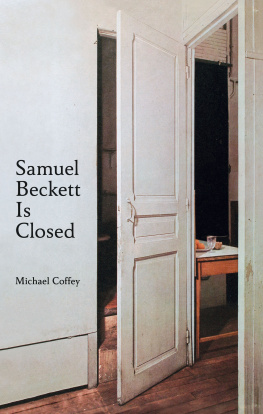
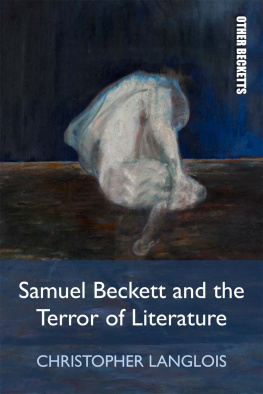

![Samuel Beckett [Samuel Beckett] - The Complete Dramatic Works](/uploads/posts/book/72751/thumbs/samuel-beckett-samuel-beckett-the-complete.jpg)
